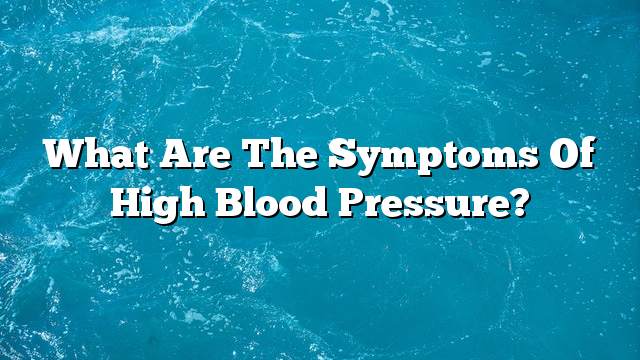blood pressure
Hypertension is sometimes called a silent killer , It does not cause any symptoms, even if it lasts for years, and studies indicate that one in five people do not know that they have high blood pressure, and they are prone to heart attacks, strokes, because it can lead to damage to blood vessels, kidneys , Heart, brain, and lungs.
Symptoms of severe blood pressure
There are symptoms in people with high blood pressure, including:
- Vision problems.
- pain in chest.
- fatigue.
- Arrhythmia.
- Severe headache.
- breathing difficulties.
- Chest prick.
- Blood in the urine.
Rare symptoms of high blood pressure
There are rare symptoms of high blood pressure that people rarely experience:
- Serious headaches.
- Dizziness seizures.
- Frequent bleeding in the nose.
Symptoms of hypertension crisis
The high blood pressure crisis is defined as an emergency where blood pressure is suddenly rising. Systolic reading is 180 and higher, and diastolic pressure reading is 110 and higher. It should be noted that when measuring a person’s blood pressure and getting high reading, waiting for a few minutes, Then check back reading, to make sure the first reading is correct, the high blood pressure crisis may include the following symptoms:
- Serious concern.
- strong headache.
- Shortness of breath.
- epistaxis.
- A hypertensive episode can cause severe complications, such as fluid accumulation in the lungs, brain edema or hemorrhage, rupture of the main artery in the heart, stroke, or episodes associated with pregnancy poisoning.
Diagnosis of high blood pressure
Blood pressure is abnormal when the blood pressure is higher than 120/80 mmHg, and high blood pressure in adults stages:
| Stage | Systolic pressure | Diastolic pressure |
|---|---|---|
| Pre-high blood pressure | 120-139 | 80-89 |
| The first stage of high blood pressure | 140-159 | 90-99 |
| The second stage of high blood pressure | 160 or on | 100 or higher |
Note: These stages for adults who do not suffer from short-term diseases, people with chronic kidney disease and diabetes, must maintain blood pressure under 130/80 mm Hg.
